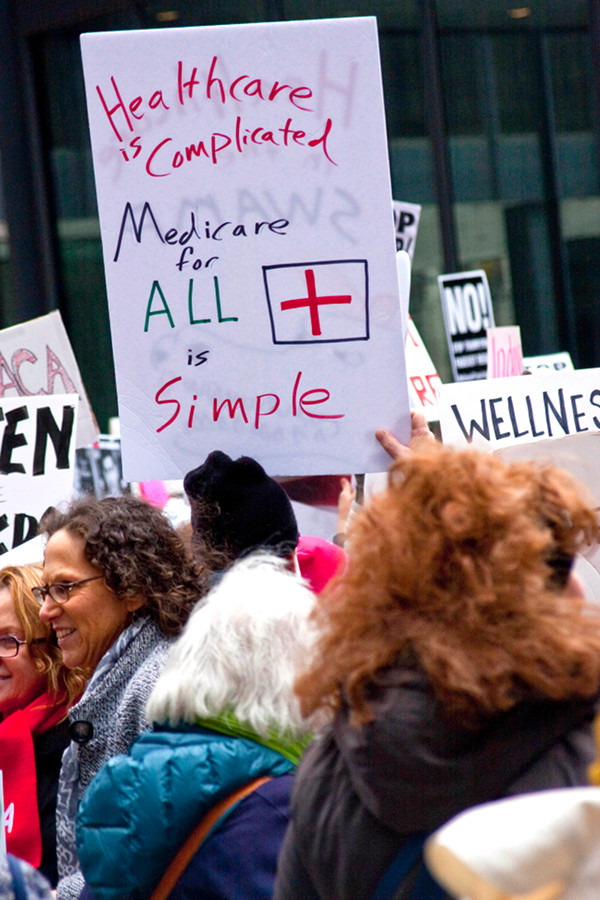
PHOTO/CHARLES EDWARD MILLER
Editor’s note: These are excerpts from a January, 2017 article by Dr. Margaret Flowers. Read full text at popularreistance.org/
Why should we support Improved Medicare for All?
Health advocates often support incremental reforms rather than calling for a change as large as National Improved Medicare for All (NIMA). In reality, creating a national single payer health plan is the smallest incremental step that can be taken to begin to solve the health care crisis. It is the only way to remove the greatest obstacle to health care in the US, the private insurance companies, and achieve the savings required to cover everyone. It is the only way that health care can start to be treated as a public good rather than a commodity for investors to make profits.
NIMA would create a national health care system that covers every person living in the US. It would be financed through a progressive tax. There would not be any insurance premiums, deductibles or co-pays, so there would not be any financial barriers to care. There would be a single standard of high quality comprehensive coverage for everyone.
When people hear about NIMA, often the first thing they say is that we can’t afford it. The reality is that we are already spending enough to cover everyone. National Improved Medicare for all would be less expensive than the current health system.
The ACA was sold to the public as a step towards a single payer system, but in fact it took the US healthcare system toward greater privatization. Instead of building up our public insurances, Medicare and Medicaid, they are being increasingly privatized. Instead of getting rid of private health insurance companies, the government became a broker for them as people are forced to buy insurance policies. And the insurance companies are given hundreds of billions of dollars each year in subsidies.
The result under the ACA is that tens of millions of people are without insurance. Tens of millions are also under-insured, they have health insurance but they still can’t afford the care they need.
The Democrats are currently working to defend the ACA. Instead of trying to preserve or tweak a broken and failed system, it is time to build on what works, Medicare.
How do we win?
The current political environment has brought National Improved Medicare for All back into the public dialogue. Senator Sanders made it a major part of his campaign platform, which sparked attacks from the Clinton campaign despite polls showing strong support for single payer. It is not possible to build on the ACA to make it a universal and affordable health system. For decades, people have accepted tinkering with the system because they have been told that small changes are the only options on the table. It is up to us to seize this moment.
The keys to winning single payer are to build a broad movement in support of it and to become more assertive in the tactics used. The NIMA movement faces the same obstacles as other social movements, the dominating influence of rich and powerful corporations that control the political system. When single issue movements work together strategically, they have the people power to overcome the power of money.
Health care is a uniting issue because it impacts all of us. And health is connected to everything; even if everyone had access to care, health outcomes would not significantly improve unless we address the social determinants of health such as wealth inequality, lack of education, homelessness, unemployment and low wages, food insecurity, systemic racism, mass incarceration, environmental toxins, and the climate crisis.
Building an effective movement for National Improved Medicare for All means understanding the realities of the challenges we face. The current political system will not put NIMA ‘on the table’ unless a popular movement forces it there. And when it is ‘on the table’, the people will have to fight to advance it.
Margaret Flowers, MD is a pediatrician who co-directs Popular Resistance. She was a candidate for US Senate in Maryland, Green Party.
